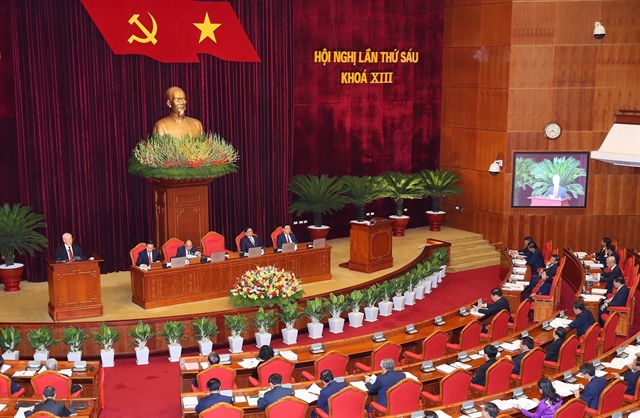 Op-Ed
Op-Ed

 |
| The sixth plenum of 13th Party Central Committee. — VNA/VNS Photo Trọng Đức |
A new regulation has clarified strict guidelines on votes of confidence for top leadership and managerial positions, ushering in a new era of accountability and transparency in the political arena.
Võ Văn Thưởng, then permanent member of the Party Central Committee’s Secretariat, on behalf of the Politburo, signed Regulation No. 96-QĐ/TW on February 2, replacing Regulation No. 262-QĐ/TW dated October 8, 2014.
Through amendments and supplements, the new regulation requires more responsibility from officials regarding votes of confidence, voters, agencies and organisations.
Stringent regulations
The new regulation maintains the viewpoints and principles of the previous one, aiming to ensure the Party leadership and the implementation of the principles of democratic centralism, criticism and self-criticism, as well as democracy, objectiveness, fairness, publicity and transparency in a confidence vote, and the use of its results, which must be reported to competent agencies and publicised in line with regulations.
However, Regulation No. 96 has some improvements.
It calls the confidence vote an important part of assessing officials' performance, which is conducted regularly. Meanwhile, Regulation No. 262 considered it an important information reference channel for evaluating and assigning officials.
Under the new regulation, officials who secure more than half but fewer than two-thirds of the low confidence votes must be removed from the personnel planning for higher positions by competent authorities.
They will also be relieved from their posts, assigned to new tasks, allowed to resign or entitled to a confidence vote following regulations. Those who receive two-thirds and above of the low confidence votes will be discharged from their current positions and assigned to lower posts, even when their terms end.
The old regulation stipulated that officials with more than 50 per cent of the low confidence votes must be excluded from the personnel planning for higher positions and given suitable tasks.
Those with two-thirds and above of the low confidence votes need to be quickly considered and will be allowed to resign or be relieved to take on another task if they fail to fulfil work requirements without waiting until the end of their terms or working age.
High sense of responsibility
Regarding the responsibility for votes of confidence, both regulations stressed the prohibition and strict handling of wrongdoings and falsification of the confidence rating or taking advantage of the votes to undermine the reputation of others, as well as internal solidarity.
However, Regulation No. 262’s Article 1 on viewpoints and principles prescribed the responsibility of all-level Party committees and organisations, agencies, units and leaders. Regulation 96 supplemented the responsibility of those who receive the confidence vote and balloters.
The supplements come from the Politburo’s new regulations saying votes of confidence hold significance as they can directly and instantly decide the political life of the targeted persons.
The officials with low confidence must be considered for removal from the personnel planning, allowed to resign, relieved or assigned to lower posts, even when their tenures have yet to end.
The new requirements have challenged each leader and manager, forcing them to self-evaluate their political will, morality, lifestyle, public behaviour, ability to promote internal solidarity, performance in the fight against corruption and other negative phenomena, and observance of rules for Party members.
The officials who win high confidence votes should show their observance of the rules and principles of organisation and operation of the Party, especially those on democratic centralism, criticism and self-criticism; follow the assignment of their agencies; and abide by regulations of all-level Party committees and organisations, and agencies and units.
They should also be dynamic, innovative, creative, decisive, and willing to bear responsibility in performing their assigned tasks. Votes of confidence should not make them avoid handling thorny, complex, sensitive issues.
Regulation 96-QĐ/TW also requires balloters to show a high sense of responsibility. They must be objective and honest enough to go beyond private relations and group interests as the votes mirror the reputation and capacity of leaders.
Either group interests or group division makes the principles of “democratic centralism, objectiveness, fairness and publicity” in a confidence vote meaningless.
There have been officials who dare to think and act, and are dynamic and creative but lose votes of confidence as their protection of common interests has been hindered by group interests.
Therefore, agencies and organisations concerned should get an objective, comprehensive evaluation of issues to ensure the confidence vote takes place practically in line with the new regulation, contributing to raising the trust of officials and Party members, and people in the Party. VNA/VNS